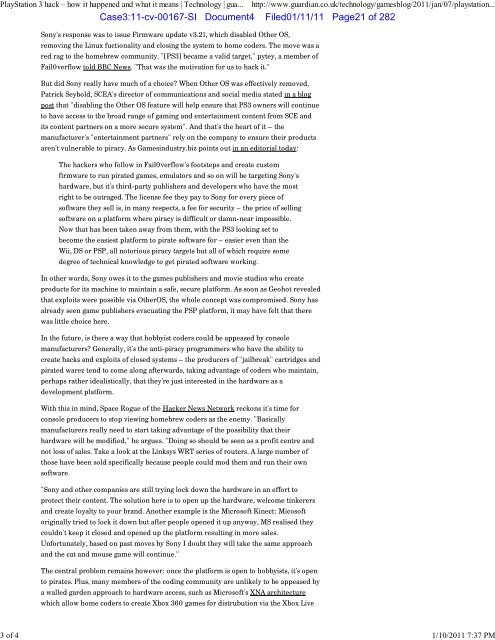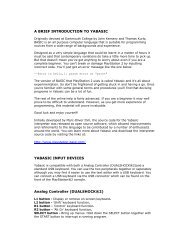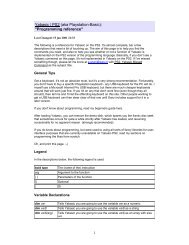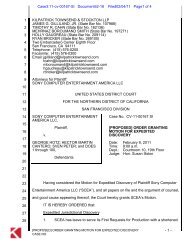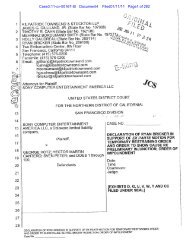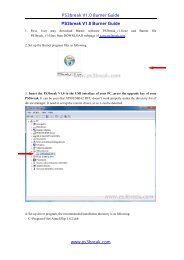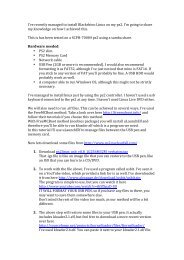You also want an ePaper? Increase the reach of your titles
YUMPU automatically turns print PDFs into web optimized ePapers that Google loves.
PlayStation 3 hack – how it happened and what it means | Technology | gua... http://www.guardian.co.uk/technology/gamesblog/2011/jan/07/playstation...<br />
Case3:11-cv-00167-SI Document4 Filed01/11/11 Page21 of 282<br />
Sony's response was to issue Firmware update v3.21, which disabled Other OS,<br />
removing the Linux fuctionality and closing the system to home coders. The move was a<br />
red rag to the homebrew community. "[PS3] became a valid target," pytey, a member of<br />
Fail0verflow told BBC News. "That was the motivation for us to hack it."<br />
But did Sony really have much of a choice? When Other OS was effectively removed,<br />
Patrick Seybold, SCEA's director of communications and social media stated in a blog<br />
post that "disabling the Other OS feature will help ensure that PS3 owners will continue<br />
to have access to the broad range of gaming and entertainment content from SCE and<br />
its content partners on a more secure system". And that's the heart of it – the<br />
manufacturer's "entertainment partners" rely on the company to ensure their products<br />
aren't vulnerable to piracy. As Gamesindustry.biz points out in an editorial today:<br />
The hackers who follow in Fail0verflow's footsteps and create custom<br />
firmware to run pirated games, emulators and so on will be targeting Sony's<br />
hardware, but it's third-party publishers and developers who have the most<br />
right to be outraged. The license fee they pay to Sony for every piece of<br />
software they sell is, in many respects, a fee for security – the price of selling<br />
software on a platform where piracy is difficult or damn-near impossible.<br />
Now that has been taken away from them, with the PS3 looking set to<br />
become the easiest platform to pirate software for – easier even than the<br />
Wii, DS or PSP, all notorious piracy targets but all of which require some<br />
degree of technical knowledge to get pirated software working.<br />
In other words, Sony owes it to the games publishers and movie studios who create<br />
products for its machine to maintain a safe, secure platform. As soon as Geohot revealed<br />
that exploits were possible via OtherOS, the whole concept was compromised. Sony has<br />
already seen game publishers evacuating the PSP platform, it may have felt that there<br />
was little choice here.<br />
In the future, is there a way that hobbyist coders could be appeased by console<br />
manufacturers? Generally, it's the anti-piracy programmers who have the ability to<br />
create hacks and exploits of closed systems – the producers of "jailbreak" cartridges and<br />
pirated warez tend to come along afterwards, taking advantage of coders who maintain,<br />
perhaps rather idealistically, that they're just interested in the hardware as a<br />
development platform.<br />
With this in mind, Space Rogue of the Hacker News Network reckons it's time for<br />
console producers to stop viewing homebrew coders as the enemy. "Basically<br />
manufacturers really need to start taking advantage of the possibility that their<br />
hardware will be modified," he argues. "Doing so should be seen as a profit centre and<br />
not loss of sales. Take a look at the Linksys WRT series of routers. A large number of<br />
those have been sold specifically because people could mod them and run their own<br />
software.<br />
"Sony and other companies are still trying lock down the hardware in an effort to<br />
protect their content. The solution here is to open up the hardware, welcome tinkerers<br />
and create loyalty to your brand. Another example is the Microsoft Kinect: Micosoft<br />
originally tried to lock it down but after people opened it up anyway, MS realised they<br />
couldn't keep it closed and opened up the platform resulting in more sales.<br />
Unfortunately, based on past moves by Sony I doubt they will take the same approach<br />
and the cat and mouse game will continue."<br />
The central problem remains however: once the platform is open to hobbyists, it's open<br />
to pirates. Plus, many members of the coding community are unlikely to be appeased by<br />
a walled garden approach to hardware access, such as Microsoft's XNA architecture<br />
which allow home coders to create Xbox 360 games for distrubution via the Xbox Live<br />
3 of 4 1/10/2011 7:37 PM


